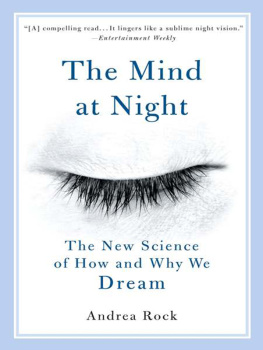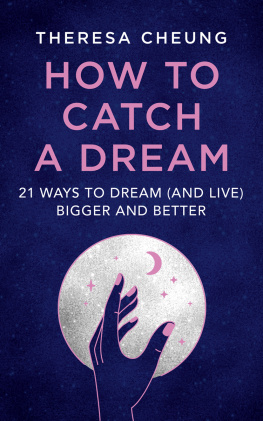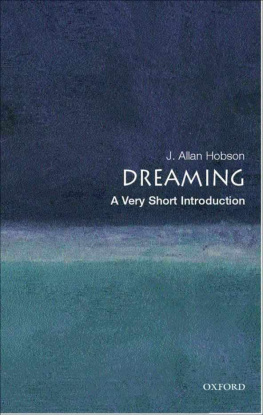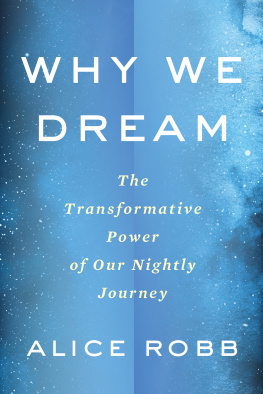Praise for The Mind at Night: The New Science of How and Why We Dream
The scientific lowdown on post-Freudian theories of dreams and dreaming.... A well-written, often entertaining look inside the mind.
Kirkus Reviews
[An] exceptionally lucid and engaging work of science writing.
Publishers Weekly
The Mind at Night is an outstanding piece of reporting that is both accessible and engaging.
Tucson Citizen
[S]ure to be regarded as a groundbreaking work on the nature of dreaming that is both instructive and accessible to the average reader.
Deseret Morning News, Salt Lake City
Rock does a brilliant job.... This book will be of relevance to stone masons and fry cooks as much as it will be to poets and painters.
The Electric Review
If youre interested in the physiology of why, and how we dream and a history of dream research, interspersed with many fascinating facts to entertain and amusethis is the book for you.
BookBrowse.com
An absolutely wonderful book!... The Mind at Night shares the best qualities of Watsons Double Helix and Gleicks Genius.
John Antrobus, cognitive neuroscientist,
City College of New Yok
THE MIND AT NIGHT
The New Science of How and Why We Dream
Andrea Rock
Copyright 2004 by Andrea Rock
Hardcover edition first published in 2004
Paperback edition first published in 2005
Published by Basic Books,
A Member of the Perseus Books Group
All rights reserved. Printed in the United States of America. No part of this book may be reproduced in any manner whatsoever without written permission except in the case of brief quotations embodied in critical articles and reviews. For information, address Basic Books, 387 Park Avenue South, New York, NY 10016.
Books published by Basic Books are available at special discounts for bulk purchases in the United States by corporations, institutions, and other organizations. For more information, please contact the Special Markets Department at the Perseus Books Group, 11 Cambridge Center, Cambridge MA 02142, or call (617) 2525298, (800) 2551514 or e-mail .
Library of Congress Cataloging-in-Publication Data
Rock, Andrea.
The mind at night : the new science of how and why we dream / Andrea Rock.1st ed.
p. cm.
Includes bibliographical references.
ISBN 0-7382-0755-1 (hardcover)
eBook ISBN: 9780786739196
1. DreamsPhysiological aspectsPopular works. I. Title.
QP426.R63 2004
154.6'3dc22
2003022389
ISBN 0-465-07069-8 (paperback)
Text design by Reginald R. Thompson
Set in 11-point CG Elante by Perseus Books Group
Preface
IVE ALWAYS WONDERED WHY my brain doesnt simply rest at night, as my body does, but instead sets to work creating an artificial world that seems as real as waking life. I dont recall my dreams with any greater frequency than most people I know, but Im intrigued by the ones I do remember and curious about whatif anythingthey mean.
Often I awaken with no memory of dreaming at all, but sometimes, my experiences in that part of my life are so vivid that my mood for the day is colored by them. My dreams of flying come only two or three times a year but they are exhilarating. Making more frequent appearances in my night life, though, are the classic anxiety dreams in which I show up to take an exam for a course Ive never attended or I arrive at a party and belatedly realize Im missing vital pieces of clothing. Then there are the out-of-control dreams, in which Im driving a car that loses its brakes or its steering just as I start down a steep, winding hill, or the pursuit dreams, where Im being chased by some dangerous person or creature. The common thread is that all of the dreams feel utterly real, from the visual details down to the emotions they trigger.
In discussing dreams with friends, I have found that the themes in mine seem to be quite common, as is my curiosity about them. I was particularly intrigued when I came across an essay by the late physicist Richard Feynman in which he posed many of the same questions about dreaming that I had. Like Feynman, I was intensely curious about why images in dreams looked so real, but I also wondered how they could feel so much like waking life. My terror when I periodically dream of my children falling from a cliff or out a window is so physiologically real that I wake with my heart racing. Mulling over the mystery of what happens to our stream of consciousness when sleep descends, Feynman zeroed in on other fascinating questions: What happens to your ideas? Youre running along very well, youre thinking clearly and what happens? Do they suddenly stop, or do they go more and more slowly and stop, or exactly how do you turn off thought?
As I discovered in the course of research for this book, you dont turn off thought. It just takes a different form. Feynman lamented the fact that he was unable to find answers to his questions about dreaming because there had been so little scientific investigation of the subject. But thanks to the dream research that has unfolded in the past two decades, many of those answers are now becoming available. I discovered surprising explanations about why dreams look and feel so realfascinating in themselves but deeply revealing about how the mind works in waking consciousness. In fact, understanding more about what makes us tick during those other sixteen hours has been one of the most exciting aspects of my journey through the world of neuroscientific research.
When I began my reporting for this book, I quickly discovered that its impossible for scientists to agree on something as seemingly simple as the definition of dreaming. Some define it narrowly as the creation of hallucinatory narratives complete with characters and a discernable plotline that occurs primarily during that period of rest known as rapid eye movement (REM) sleepwhen, as the name suggests, you see a sleepers eyes darting back and forth beneath closed lids. At the other end of the spectrum are researchers who classify any mental activity that occurs during any stage of sleep as dreaming, and some even argue that dreamlike mental processes during waking states, such as meditation, should also be included in the definition. After months spent interviewing scientists, serving in labs as a test subject myself, and digesting stacks of studies, dream reports, and other related material, it was clear to me that a definition of dreaming that edges toward the broader end of the spectrum best reflects the scope of knowledge thats emerged from dream research.
For the purpose of discussion in the chapters ahead, I define a dream as a mental experience during sleep that can be described dur-viii ing waking consciousness. Some dreams are relatively mundane, while others are hallucinatory masterpieces. Of course, were likely to be able to provide a description only if were awakened in the midst of a dream or immediately after it ends. But even though we dont recall the majority of our dreams, theyre still being produced each night. And research demonstrates that they can affect the quality of our waking hours whether we remember them or not.
The mind at night is surprisingly active, I learned, and not just when it is churning out a scenario in which were suddenly able to fly without an airplane. Using the same neural circuitry that permits us to navigate the world during the day, the brain on its night shift performs an impressive array of important cognitive tasks. For instance, when were just drifting off to sleep, we experience dreamy but plotless imagery that is associated with one of the vital functions the brain performs at night: rerunning experience to extract whats important enough to be incorporated into long-term memory, thereby updating the internal model of the world that helps guide our daytime behavior. In the pages ahead, then, youll discover how the mind concocts the vivid cinematic mental productions that we typically think of when the word











